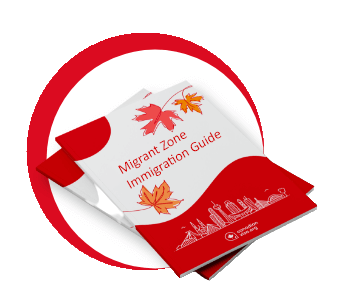
Canada is a land of diverse opportunities, a vibrant economy, and a high standard of living that attracts people from all over the world. One of the popular pathways to immigrate to Canada is through the skilled worker program, which allows individuals with in-demand skills and experience to settle permanently in the country. For those with a background in law, immigrating to Canada as a paralegal could be a viable option.
Paralegals play a critical role in the Canadian legal system. They work alongside lawyers to provide legal services to clients, conduct legal research, draft legal documents, and assist with court proceedings. With a growing demand for legal services in Canada, the need for qualified paralegals is on the rise, making it an excellent career path for those seeking to immigrate to Canada.
Paralegals (TEER 42200) can earn a very attractive salary in Canada, earning up to $74,000 per year, according to Indeed. What's more, as soon as you become a permanent resident both you and your family members who join you, will have access to fantastic benefits such as free universal healthcare, free public schooling and much more.
Ready to find out how you can join Canada’s legal team?
How Do I Immigrate to Canada as a Paralegal?

As a highly-skilled professional, the sky's the limit when it comes to immigrating to Canada, provided you meet the general admission requirements to enter Canada as well as the immigration programs you intend to apply through.
Two of the most popular Canadian Immigration options for you as a paralegal are:
1. Express Entry
The Express Entry (EE) system is a points-based system that manages 3 Canadian federal economic immigration programs:
- The Federal Skilled Worker Program (FSWP);
- The Federal Trade Worker Program (FSTP); and
- The Canada Experience Class (CEC).
Invitation to Apply (ITA) for As a highly-skilled professional you could be eligible to apply for permanent residence through the FSWP or the CEC (if you have at least 1 year of Canadian work experience). By having an active Express Entry profile, you will be entered into draws every two weeks. If your profile is amongst the highest scoring applicants’ you could receive an permanent residence in Canada in as little as 6 months. You can use our CRS calculator to find out if you have enough points to start your evaluation process.
2. Provincial Nominee Program
in-demand jobs in CanadaThe Provincial Nominee Program allows you to live and work in Canada if you meet the labour demands of that particular province or territory. Most provinces/territories have their own PNPs with specific requirements. Unlike the Express Entry system, you may require a job offer to qualify however having a provincial nomination is worth 600 extra PR points, which means that it's more than likely that you’ll be invited to apply for Canadian permanent residence. As mentioned previously, you may want to consider Manitoba or Nova Scotia as paralegals are on their lists of .
Below is a list of PNP streams or categories, in each province or territory, for paralegals who want to immigrate to Canada.
| Canadian Immigration for Paralegals | |
|---|---|
| Province/Territory | Immigration Stream/Category |
| Alberta | Express Entry Stream |
| British Columbia | Express Entry Skilled Worker Category |
| Manitoba | Skilled Workers Overseas Stream |
| Newfoundland and Labrador | Skilled Worker Stream |
| Northwest Territories | Skilled Worker Stream |
| Nova Scotia | Nova Scotia Demand: Express Entry Stream |
| Ontario | Express Entry Human Capital Priorities Stream Express Entry French-speaking Skilled Worker Stream |
| Saskatchewan | International Skilled Worker Category |
| Yukon | Skilled Worker Stream |
How Much Does a Paralegal Make in Canada?

Paralegals who live and work in Canada can expect to earn an average hourly wage of $28 per hour or anywhere between $20.26 to $31 per hour depending on your education and work experience as well as which province you will be based in when you immigrate to Canada.
This is what you can expect to earn (according to Talent.com) as a paralegal or legal assistant in Canada:
| Average Annual Income As a Paralegal per Province | |
|---|---|
| Quebec | $74,398 |
| British Columbia | $67,570 |
| Ontario | $67,500 |
| Alberta | $63,375 |
| Nova Scotia | $50,000 |
| Manitoba | $48,500 |
* In $CAD
Provinces in Canada That Need Paralegals

Yes, paralegals are in demand in Canada, particularly in Manitoba and Nova Scotia. According to Job Bank Canada, the outlook for paralegals are also very positive over the next three years in provinces such as British Columbia, Quebec and Saskatchewan with an estimated total of 14,200 new jobs to be created over the next 8 to 10 years due to expansion, replacement, school leavers, immigration and mobility.
What Qualifications Do I Need to Become a Paralegal in Canada?
Most Canadian law firms require a bachelor’s degree in law or a law college diploma and in-house training from a law firm or establishment. You will also need an Education Credential Assessment (ECA) if you have not received your law qualification from a Canadian university or college.
You may also require a licence in order to perform advanced legal services, which may require you to work in a specialised area law for at least two years and pass an examination. Each province has its own law society which can be found on the Federation of Law Societies of Canada website.
Becoming a Paralegal in Canada

The best way to immigrate to Canada as a paralegal is to get your law degree in Canada. By studying in Canada you will not only receive a world-class education but will be able to apply to stay on and live and work in Canada through the Post-Graduate Work Program and gain the work experience that you need to apply for permanent residency in Canada. Some provinces also offer specific immigration programs for international students who have studied in the province or territory.
Some top universities to consider to obtain your law qualification include:
- The University of Alberta
- University of Toronto
- McGill University
- University of British Columbia
- York University
- University of Ottawa
- University of Montreal
- Queen’s University.
How We Can Help You Immigrate to Canada as a Paralegal

Applying for a visa can be time-consuming and confusing. With strict deadlines, procedures and requirements to adhere to, it can be easy to make a mistake that could cost you your chance to immigrate to Canada. But with the guidance and assistance of one of our knowledgeable Regulated Canadian Immigration Consultants (RCIC’s), the process will be stress-free.
When you choose to use our expert and government trusted services, you will receive:
- An in-depth eligibility assessment
- Guidance on which of 100+ immigration programs and visas to choose from;
- An immigration plan tailored to your individual needs;
- A review and submission of all application forms and documentation; as well as
- Support through every step of the application process.
FAQs

Can I Immigrate to Canada as a Paralegal Without a Diploma or Degree in Paralegal Studies?
Yes, it may be possible to immigrate to Canada as a paralegal without a diploma or degree in paralegal studies if you have relevant work experience or if you complete a paralegal training program in Canada. However, it is important to note that some employers may prefer candidates with a formal education in paralegal studies.
What Kind of Job Opportunities are Available for Paralegals in Canada?
Paralegals in Canada can work in a variety of settings, including law firms, government agencies, corporate legal departments, and non-profit organizations. Some common job titles for paralegals in Canada include litigation paralegal, corporate paralegal, immigration paralegal, and intellectual property paralegal.
Can I Apply for Permanent Residency in Canada as a Paralegal?
Yes, paralegals who are eligible for one of Canada's immigration programs can apply for permanent residency. If you meet the eligibility criteria and are successful in your application, you may be able to live and work in Canada permanently. It is important to note that the immigration process can be complex and time-consuming, so it is recommended that you seek the advice of an immigration lawyer or consultant to assist you with your application.





